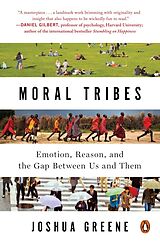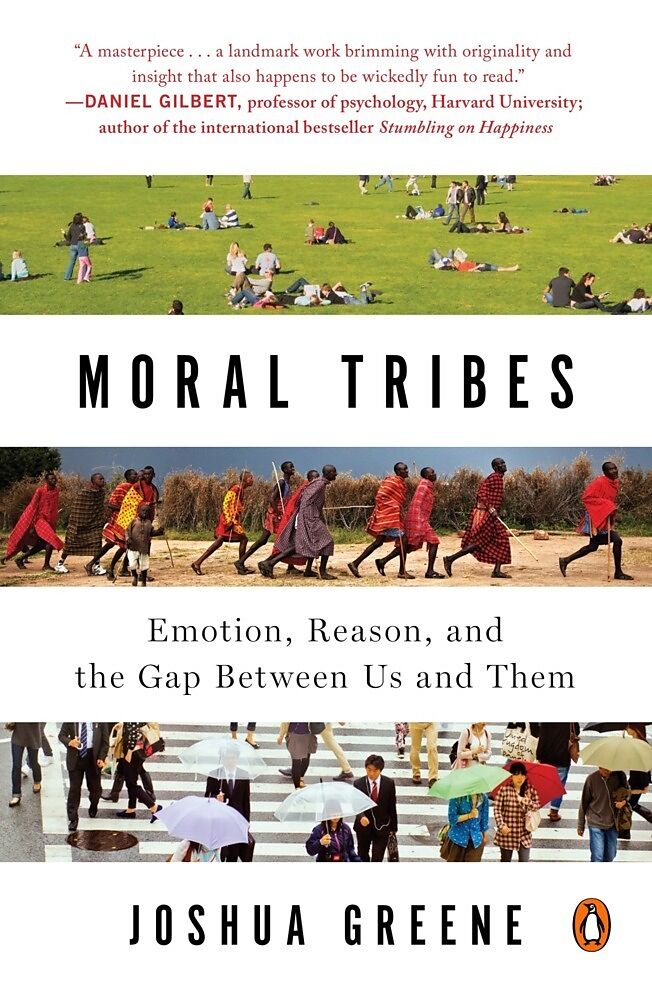Moral Tribes
Einband:
Kartonierter Einband
EAN:
9780143126058
Untertitel:
Emotion, Reason, and the Gap Between Us and Them
Autor:
Joshua Greene
Herausgeber:
Penguin LLC US
Anzahl Seiten:
422
Erscheinungsdatum:
30.12.2014
ISBN:
0143126059
A grand synthesis of neuroscience, psychology, and philosophy, Moral Tribes refashions our deepest beliefs about how moral thinking works and how it can work better.
Zusatztext 44608315 Informationen zum Autor JOSHUA GREENE is the John and Ruth Hazel Associate Professor of the Social Sciences and the director of the Moral Cognition Lab in Harvard University's Department of Psychology. His research has been supported by the National Science Foundation, the National Institutes of Health, and the MacArthur Foundation. Greene has appeared on Charlie Rose and Scientific American Frontiers , and his work has been featured in the New York Times, Discover Magazine , WNYC's RadioLab , and NPR's Morning Edition . Klappentext "Surprising and remarkableToggling between big ideas! technical details! and his personal intellectual journey! Greene writes a thesis suitable to both airplane reading and PhD seminars."-The Boston Globe Our brains were designed for tribal life! for getting along with a select group of others (Us) and for fighting off everyone else (Them). But modern times have forced the world's tribes into a shared space! resulting in epic clashes of values along with unprecedented opportunities. As the world shrinks! the moral lines that divide us become more salient and more puzzling. We fight over everything from tax codes to gay marriage to global warming! and we wonder where! if at all! we can find our common ground. A grand synthesis of neuroscience! psychology! and philosophy! Moral Tribes reveals the underlying causes of modern conflict and lights the way forward. Greene compares the human brain to a dual-mode camera! with point-and-shoot automatic settings ("portrait!" "landscape") as well as a manual mode. Our point-and-shoot settings are our emotions-efficient! automated programs honed by evolution! culture! and personal experience. The brain's manual mode is its capacity for deliberate reasoning! which makes our thinking flexible. Point-and-shoot emotions make us social animals! turning Me into Us. But they also make us tribal animals! turning Us against Them. Our tribal emotions make us fight-sometimes with bombs! sometimes with words-often with life-and-death stakes. A major achievement from a rising star in a new scientific field! Moral Tribes will refashion your deepest beliefs about how moral thinking works and how it can work better. Introduction The Tragedy of Commonsense Morality To the east of a deep, dark forest, a tribe of herders raises sheep on a common pasture. Here the rule is simple: Each family gets the same number of sheep. Families send representatives to a council of elders, which governs the commons. Over the years, the council has made difficult decisions. One family, for example, took to breeding exceptionally large sheep, thus appropriating more of the commons for itself. After some heated debate, the council put a stop to this. Another family was caught poisoning its neighbors' sheep. For this the family was severely punished. Some said too severely. Others said not enough. Despite these challenges, the Eastern tribe has survived, and its families have prospered, some more than others. To the west of the forest is another tribe whose herders also share a common pasture. There, however, the size of a family's flock is determined by the family's size. Here, too, there is a council of elders, which has made difficult decisions. One particularly fertile family had twelve children, far more than the rest. Some complained that they were taking up too much of the commons. A different family fell ill, losing five of their six children in one year. Some thought it unfair to compound their tragedy by reducing their wealth by more than half. Despite these challenges, the Western tribe has survived, and its families have prospered, some more than others. To the north of the forest is yet another tribe. Here there is no common pasture. Each family has its own plot of land, surrounded by a fence. These plots vary greatl...
Robert Wright, The Atlantic:
“[Greene’s] concern is emphatic, his diagnosis precise, and his plan of action very, very ambitious. The salvation of humankind is possible, but it’s going to take concerted effort… [a] rich, sprawling book."
The Boston Globe:
"Surprising and remarkable… Toggling between big ideas, technical details, and his personal intellectual journey, Greene writes a thesis suitable to both airplane reading and PhD seminars… Moral Tribes offers a psychology far beyond the realm of self-help, instead probing the intricacy and complexity of morality in an attempt to help, and perhaps unite, entire communities."
Robert M. Sapolsky, The Wall Street Journal:
“Superb."
Christian Perring, Metapsychology:
“More interesting than its defense of Utilitarianism is the fact that Moral Tribes is one of the first attempts to bring experimental philosophy to a wider audience. Making technical philosophy accessible to a wider group is something that academic philosophers have not done enough. Greene provides a fascinating glimpse of what it might be to do scientifically informed moral philosophy.”
Sasha Pfeiffer and Anthony Brooks, WBUR:
“Joshua Green has a fascinating new book about how we make moral decisions. With a deep knowledge of philosophy and using brain scan science, the Harvard psychologist probes some big questions. Questions like why is it we’re capable of putting the welfare of our communities above our own personal welfare? In other words we’re pretty good at making tribal life work, but then why do groups of people: sports fans, political partisans, religious believers, Americans, have so much trouble getting along with other groups? The question is hugely important in this modern world when conflicts among political parties, religious faiths and nations have dramatic consequences. It’s at the core of Joshua Greene’s new book.”
Thomas Nagel, New Republic:
“Joshua Greene, who teaches psychology at Harvard, is a leading contributor to the recently salient field of empirical moral psychology. This very readable book presents his comprehensive view of the subject, and what we should make of it. Greene offers much more experimental detail and some ingenious psychological proposals about why our gut reactions have the particular subtle contours that they do.”
Publishers Weekly:
“With a humorous, relaxed tone, Greene stacks piles of evidence from well-researched studies onto his theory of modern-day morality. Having spent most of his academic career on the study of morality, Greene foresees the questions his readers have and systematically addresses every doubt and concern. As he mixes 20th-century philosophical moral treatises with neuroscience and psychological studies—many of which were undertaken by his colleagues in the field of moral psychology—Greene’s role as educator shines through; his writing is clear and his examples simple yet intriguing.”
Vanessa Bush, Booklist:
“Greene’s strategies for examining moral reasoning are as applicable to day-to-day decisions as they are to public policy. This is a highly accessible look at the complexities of morality.”
Kirkus Reviews:
"A provocative, if Utopian, call for a new 'common currency of observable evidence…not to gain advantage over others, but simply because it’s good.'”
Daniel Gilbert, professor of psychology, Harvard University; author of the international bestseller Stumbling on Happiness

Leider konnten wir für diesen Artikel keine Preise ermitteln ...
billigbuch.ch sucht jetzt für Sie die besten Angebote ...
Die aktuellen Verkaufspreise von 6 Onlineshops werden in Realtime abgefragt.
Sie können das gewünschte Produkt anschliessend direkt beim Anbieter Ihrer Wahl bestellen.
Loading...
Die aktuellen Verkaufspreise von 6 Onlineshops werden in Realtime abgefragt.
Sie können das gewünschte Produkt anschliessend direkt beim Anbieter Ihrer Wahl bestellen.
| # | Onlineshop | Preis CHF | Versand CHF | Total CHF | ||
|---|---|---|---|---|---|---|
| 1 | Seller | 0.00 | 0.00 | 0.00 |
